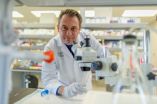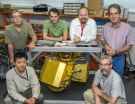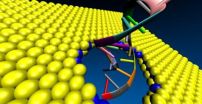(Press-News.org) SAN ANTONIO (August 14, 2014) — New findings published today in the journal Cancer Research reveal that some postmenopausal overweight breast cancer patients who use common anti-inflammatory drugs like aspirin or ibuprofen have significantly lower breast cancer recurrence rates.
Researchers from the Cancer Therapy & Research Center at The University of Texas Health Science Center at San Antonio and the University of Texas at Austin began by examining blood serum from CTRC breast cancer patients, said CTRC oncologist Andrew Brenner, M.D., Ph.D.
Studying Blood Serum
They placed the serum in a culture of fat cells that make estrogen, and then placed the serum on breast cancer cells. The serum from overweight and obese patients caused the cancer cells to grow much more aggressively than the serum from patients who were not overweight.
"It looks like the mechanism is prostaglandins, which have a role in inflammation, and there's more of it in the obese patient serum," Dr. Brenner said.
Based on those findings, the researchers did a retrospective study on patients from the CTRC and the START Center for Cancer Care. They were segregated into those taking COX2 inhibitors (aspirin or ibuprofen) and those who did not.
Finding a Lower Recurrence Rate
"Patients who were on COX2 inhibitors tended to have a lower recurrence rate," Dr. Brenner said.
Anti-inflammatory use reduced the recurrence rate of ERα positive breast cancer by 50 percent and extended patients' disease-free period by more than two years. ER positive breast cancers, cancers that grow in response to exposure to the hormone estrogen, are among the most common form of the disease, accounting for approximately 75 percent of diagnoses.
Cancer researcher Linda deGraffenried, Ph.D., from The University of Texas at Austin, designed the study, working closely with Dr. Brenner and Murali Beeram, M.D., a cancer specialist from the START Center.
The investigators caution that these results are preliminary.
"Overweight or obese women diagnosed with breast cancer are facing a worse prognosis than normal-weight women," said Dr. deGraffenried, who is also adjunct assistant professor in the Department of Cellular and Structural Biology at the Health Science Center.
Facing a Different Disease
"We believe that obese women are facing a different disease. There are changes at the molecular level. We want to reduce the disease-promoting effects of obesity."
Based on those results, the CTRC has launched a pilot anti-inflammatory trial in a joint venture with UT Austin, and the research partners are seeking funding for a larger study.
"We would like to identify which women are most likely to benefit from interventions like adding NSAIDs to treatment regimens," Dr. deGraffenried said.
INFORMATION:
The study published in Cancer Research was funded by the United States Department of Defense, Breast Cancer Research Program (W81XWH-11-1-0132) and by the National Cancer Institute (CA054174).
For current news from the UT Health Science Center, please visit our news release website or follow us on Twitter @uthscsa and Facebook.
The Cancer Therapy & Research Center (CTRC) at The University of Texas Health Science Center at San Antonio is one of the elite academic cancer centers in the country to be named a National Cancer Institute (NCI) Designated Cancer Center, and is one of only four in Texas. A leader in developing new drugs to treat cancer, the CTRC Institute for Drug Development (IDD) conducts one of the largest oncology Phase I clinical drug programs in the world, and participates in development of cancer drugs approved by the U.S. Food & Drug Administration. For more information, visit http://www.ctrc.net.
Aspirin may slow recurrence in breast cancer patients
UT Health Science Center San Antonio oncologist reveals findings
2014-08-14
ELSE PRESS RELEASES FROM THIS DATE:
Protein found to block benefits of vitamin A cancer therapy
2014-08-14
Retinoic acid is a form of vitamin A that is used to treat and help prevent the recurrence of a variety of cancers, but for some patients the drug is not effective. The reason for this resistance was unclear until this week when researchers from Virginia Commonwealth University (VCU) Massey Cancer Center demonstrated that a protein known as AEG-1 blocks the effects of retinoic acid in leukemia and liver cancer. Because AEG-1 is overexpressed in nearly every cancer, these findings could impact the care of countless cancer patients.
Details of the study were published ...
Lionfish characteristics make them more 'terminator' than predator
2014-08-14
SACRAMENTO, Calif. – New research on the predatory nature of red lionfish, the invasive Pacific Ocean species that is decimating native fish populations in parts of the Caribbean Sea and Atlantic Ocean, seems to indicate that lionfish are not just a predator, but more like the "terminator" of movie fame.
The finding of behavior that was called "alarming" was presented today by Kurt Ingeman, a researcher from Oregon State University, at the annual meeting of the Ecological Society of America.
Most native predatory fish are attracted to prey when their numbers are high, ...
NSAIDs may lower breast cancer recurrence rate in overweight and obese women
2014-08-14
PHILADELPHIA — Recurrence of hormone-related breast cancer was cut by half in overweight and obese women who regularly used aspirin or other nonsteroidal anti-inflammatory drugs (NSAIDs), according to data published in Cancer Research, a journal of the American Association for Cancer Research.
"Our studies suggest that limiting inflammatory signaling may be an effective, less toxic approach to altering the cancer-promoting effects of obesity and improving patient response to hormone therapy," said Linda A. deGraffenried, PhD, associate professor of nutritional sciences ...
Mayo Clinic challenges some recommendations in updated cholesterol treatment guideline
2014-08-14
A Mayo Clinic task force challenges some recommendations in the updated guideline for cholesterol treatment unveiled by the American College of Cardiology (ACC) and American Heart Association (AHA) in 2013. The task force concludes, based on current evidence, that not all patients encouraged to take cholesterol-lowering medications, such as statins, may benefit from them and that the guideline missed some important conditions that might benefit from medication.
Furthermore, the task force believes an emphasis needs to be placed on an individualized treatment approach ...
NSAIDs benefit overweight breast cancer patients, study finds
2014-08-14
AUSTIN, Texas — Researchers have determined that postmenopausal overweight or obese breast cancer patients receiving hormone therapy as part of their treatment and who use nonsteroidal anti-inflammatory drugs (NSAIDs) such as aspirin or ibuprofen have significantly lower breast cancer recurrence rates and a sizable delay in time to cancer recurrence.
The findings, published in the Aug. 14 edition of Cancer Research, suggest a new possibility for reducing the incidence of breast cancer recurrence among overweight and obese postmenopausal women, who have a comparatively ...
Scientists make major breakthrough in understanding leukemia
2014-08-14
Scientists from Queen Mary University of London (QMUL) have discovered mutations in genes that lead to childhood leukaemia of the acute lymphoblastic type – the most common childhood cancer in the world.
The study was conducted amongst children with Down's syndrome – who are 20-50 times more prone to childhood leukaemias than other children – and involved analysing the DNA sequence of patients at different stages of leukaemia.
The researchers uncovered that two key genes (called RAS and JAK) can mutate to turn normal blood cells into cancer cells. However, these ...
Can our computers continue to get smaller and more powerful?
2014-08-13
From their origins in the 1940s as sequestered, room-sized machines designed for military and scientific use, computers have made a rapid march into the mainstream, radically transforming industry, commerce, entertainment and governance while shrinking to become ubiquitous handheld portals to the world.
This progress has been driven by the industry's ability to continually innovate techniques for packing increasing amounts of computational circuitry into smaller and denser microchips. But with miniature computer processors now containing millions of closely-packed transistor ...
UT Arlington team's work could lead to earlier diagnosis, treatment of mental diseases
2014-08-13
A computer science and engineering associate professor and her doctoral student graduate are using a genetic computer network inference model that eventually could predict whether a person will suffer from bipolar disorder, schizophrenia or another mental illness.
The findings are detailed in the paper "Inference of SNP-Gene Regulatory Networks by Integrating Gene Expressions and Genetic Perturbations," which was published in the June edition of Biomed Research International. The principal investigators were Jean Gao, an associate professor of computer science and engineering, ...
Three radars are better than one: Field campaign demonstrates two new instruments
2014-08-13
Putting three radars on a plane to measure rainfall may seem like overkill. But for the Integrated Precipitation and Hydrology Experiment field campaign in North Carolina recently, more definitely was better.
The three instruments, developed by the High Altitude Radar group at NASA's Goddard Space Flight Center in Greenbelt, Maryland, flew as part of the Global Precipitation Measurement (GPM) mission's six-week ground-validation program that took place May 1 through June 15 in the southern Appalachians, specifically to measure rain in difficult-to-forecast mountain regions. ...
New material could enhance fast and accurate DNA sequencing
2014-08-13
CHAMPAIGN, Ill. — Gene-based personalized medicine has many possibilities for diagnosis and targeted therapy, but one big bottleneck: the expensive and time-consuming DNA-sequencing process.
Now, researchers at the University of Illinois at Urbana-Champaign have found that nanopores in the material molybdenum disulfide (MoS2) could sequence DNA more accurately, quickly and inexpensively than anything yet available.
"One of the big areas in science is to sequence the human genome for under $1,000, the 'genome-at-home,'" said Narayana Aluru, a professor of mechanical ...
LAST 30 PRESS RELEASES:
Striking genomic architecture discovered in embryonic reproductive cells before they start developing into sperm and eggs
Screening improves early detection of colorectal cancer
New data on spontaneous coronary artery dissection (SCAD) – a common cause of heart attacks in younger women
How root growth is stimulated by nitrate: Researchers decipher signalling chain
Scientists reveal our best- and worst-case scenarios for a warming Antarctica
Cleaner fish show intelligence typical of mammals
AABNet and partners launch landmark guide on the conservation of African livestock genetic resources and sustainable breeding strategies
Produce hydrogen and oxygen simultaneously from a single atom! Achieve carbon neutrality with an 'All-in-one' single-atom water electrolysis catalyst
Sleep loss linked to higher atrial fibrillation risk in working-age adults
Visible light-driven deracemization of α-aryl ketones synergistically catalyzed by thiophenols and chiral phosphoric acid
Most AI bots lack basic safety disclosures, study finds
How competitive gaming on discord fosters social connections
CU Anschutz School of Medicine receives best ranking in NIH funding in 20 years
Mayo Clinic opens patient information office in Cayman Islands
Phonon lasers unlock ultrabroadband acoustic frequency combs
Babies with an increased likelihood of autism may struggle to settle into deep, restorative sleep, according to a new study from the University of East Anglia.
National Reactor Innovation Center opens Molten Salt Thermophysical Examination Capability at INL
International Progressive MS Alliance awards €6.9 million to three studies researching therapies to address common symptoms of progressive MS
Can your soil’s color predict its health?
Biochar nanomaterials could transform medicine, energy, and climate solutions
Turning waste into power: scientists convert discarded phone batteries and industrial lignin into high-performance sodium battery materials
PhD student maps mysterious upper atmosphere of Uranus for the first time
Idaho National Laboratory to accelerate nuclear energy deployment with NVIDIA AI through the Genesis Mission
Blood test could help guide treatment decisions in germ cell tumors
New ‘scimitar-crested’ Spinosaurus species discovered in the central Sahara
“Cyborg” pancreatic organoids can monitor the maturation of islet cells
Technique to extract concepts from AI models can help steer and monitor model outputs
Study clarifies the cancer genome in domestic cats
Crested Spinosaurus fossil was aquatic, but lived 1,000 kilometers from the Tethys Sea
MULTI-evolve: Rapid evolution of complex multi-mutant proteins
[Press-News.org] Aspirin may slow recurrence in breast cancer patientsUT Health Science Center San Antonio oncologist reveals findings






